► Electric vehicle charging costs explained
► Find out which EVs are cheapest to charge
► Additional tax savings outlined, too
Electric cars are gaining in popularity and made up 17 percent of all new cars registered last year. It’s easy to see why: driving ranges are constantly improving, they’re a big step towards sustainable motoring and the public charging infrastructure is slowly expanding, removing barriers to entry.
No longer scorned for being fancy golf carts or milk floats, electric cars are gradually entering the mainstream. The savings and running cost advantages of EVs are particularly attractive – the promise of potentially cheaper refuelling bills, lower tax and reduced motoring costs hold widespread appeal.
They might cost more to buy in the first place, but EVs should reduce your running costs thereafter. It is crucial that you consider both costs before you decide if an EV is right for you.
So is it cheaper to run an electric car?
The past 12 months have seen energy costs see-saw in dramatic fashion – and it’s made the electric vs petrol calculation harder to answer. Historically, electricity was almost always cheaper than fossil fuels, but that premise has been upset in recent months, as war in Ukraine wreaked havoc with our energy bills.
In this article, we’ll help you crunch the maths so you can work out how much an electric car would cost you to charge – at home and in public.
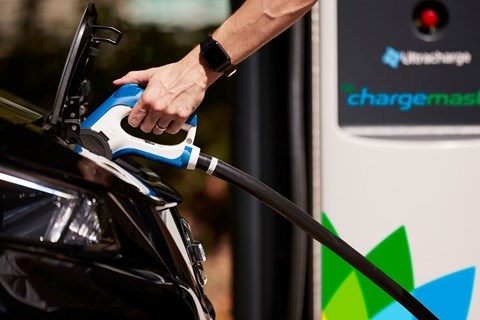
The wider benefits of electric cars remain, and most EV drivers will gain from reduced maintenance bills and enjoy perks such as free entry to low-emissions zones and zero road tax fees (for the time being).
We’d recommend all EV owners install a home charging wallbox before they take delivery of their car. Depending on your typical driving routine, many electric car owners may find they hardly ever step foot in a public fuel station again – and that’s got to be a win in our book.
How much does it cost to charge an electric car?
This depends on the capacity of an EV’s battery, typically expressed in kilowatt hours (kWh) – the same metric used to measure your home’s energy consumption. So, if you know the size of an EV’s battery pack and you’re aware of how much money your energy supplier charges you for each kWh of electricity, it’s easy to figure out how much it will cost you to charge the car from home.
In simple terms, the maths works like this: size of EV’s battery pack × electricity cost of your supplier (in pence per kWh) = cost to charge an electric car from empty to full.
We’ll use the Kia EV6 as an example. It’s powered by a 77.4kWh battery pack. At the time of writing, a typical British Gas account holder would pay an electricity cost per kWh of 38p (around 50% more what it was 18 months ago).
So, 77.4 × £0.38 = £29.41 is the cost of charging the car from empty to full at home. That’s up from £21.67 before the Ukraine invasion and soaring energy prices, but considerably lower than its peak in mid-2022.
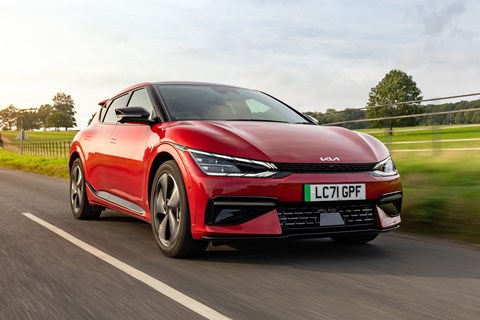
However, it’s worth noting that it’ll take more than seven hours to charge the EV6 from empty to full using a typical 7kWh home wallbox – so it’s best to leave it plugged in overnight. It may well take longer than your tariff’s cheaper off-peak period, making accurate calculations even harder. You have been warned.
If you’re in a hurry, public rapid chargers such as those provided by Ionity and BP Pulse can charge the EV6’s battery pack to 80 percent capacity in as little as 18 minutes. The most powerful 350kW chargers really pump in energy at a rate of knots (although they also dent the longevity of the battery, if over-used).
It’s more expensive to use a public rapid charger, as you pay for the fancy charging technology and the convenience of short wait times. At time of writing in March 2023, Ionity was charging £0.69 per kWh – which equates to £53.40 for a full charge with the same Kia EV6.
You should also consider community charging platforms like Co Charger or JustCharge, which enable you to connect with local EV drivers with a private charge point and use their charger overnight. The owner sets the price but they are priced and available by the hour, rather than by the unit.
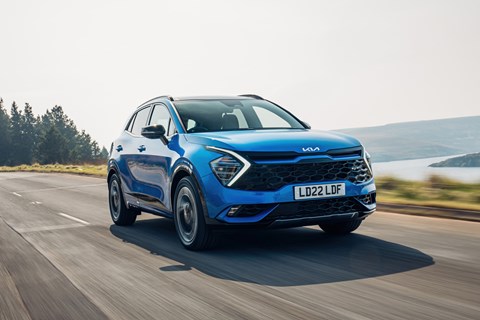
So is an EV still cheaper than a petrol or diesel car in 2023? The EV6’s nearest combustion-engined equivalent, the Kia Sportage (above), has a 54-litre fuel tank. At the time of writing, petrol was sitting at an average price of £1.48p in spring 2023, according to the AA fuel price index – meaning you’re looking at a bill of around £80 to fill the Sportage’s tank from empty.
The petrol car will probably go a little further than the EV on one ‘tank’, but the electric car works out cheaper.
How much does it cost to charge a Tesla?
Teslas, along with other premium brands, now offer huge batteries, which have high capacities and therefore bigger bills to recharge. Consider a 100kWh Tesla Model S. At the time of writing, the company’s Supercharger network costs £0.45p per kilowatt-hour for Tesla drivers who have to pay, so the total outlay is 100 x 28p = £45 if you were to theoretically charge from completely empty to full. Some early owners qualified for free charging, but they’re now in the minority.
Switch to a cheaper home supply, which could cost as little as 12p per kWh on a good-value overnight tariff, and the maths works out at a more palatable 100 x 12p = £12, for that same Tesla. As you can see, the devil is in the detail when trying to work out EV running costs!
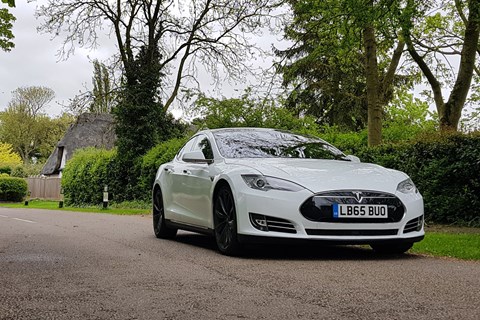
Our research shows a significant financial saving compared to the cost of fuelling a conventional petrol or diesel car, if you can charge on a competitive tariff at home.
Note that tariffs like Economy 7 tend to enable you to charge at this lower price for a maximum of seven hours. Energy providers like EDF Energy and Octopus Energy are however offering EV-specific tariffs which use a similar model to give EV drivers the best opportunity to cut costs.
We appreciate that we’ve thrown a lot of figures at you during the last few paragraphs – so here’s a summary of our top tips to reduce the cost of running an EV:
- Install a home wallbox
- Switch to a competitive tariff (and consider an EV specific package)
- Charge your electric car overnight at home, if you can
- Steer clear of expensive rapid chargers unless absolutely necessary
Do all of that, and you could slash your fuel bills by as much as 25 percent.
The best electric cars you can buy
The cheapest electric cars to run
We’ve done the maths on some popular EVs to calculate what it costs to charge each car. In reality, you never charge a car from 0-100 percent, but this is the theoretical cost to charge (the range shows the cheapest home charging up a pricier rapid charge on the road):
| | Vehicle | Cost to fully charge | Cost per 100 miles |
| 1 | Nissan Leaf | £4.80 – £27.60 | £2.01 – £11.55 |
| 2 | Mini Electric | £3.91 – £22.49 | £2.70 – £15.51 |
| 3 | Mercedes EQE 300 | £10.80 – £62.10 | £2.73 – £15.72 |
| 4 | Audi Q4 e-tron | £6.60 – £37.95 | £2.76 – £15.88 |
| 5 | Peugeot e-208 | £6.00 – £34.50 | £2.76 – £15.90 |
| 6 | Vauxhall Corsa-e/Mokka-e | £6.00 – £34.50 | £2.87 – £16.51 |
| 7 | Smart #1 | £7.92 – £45.54 | £2.90 – £16.68 |
| 8 | Volkswagen ID.5 | £9.24 – £53.13 | £2.95 – £16.97 |
| 9 | Ford Mustang Mach-E (SR) | £8.16 – £46.92 | £2.99 – £17.19 |
| 10 | Tesla Model 3 (SR) | £6.48 – £37.26 | £3.01 – £17.33 |
Range given from lowest home cost (12p) to highest public charge cost £69p)Electric car battery tech explained: costs, capacity and longevity
Home charging is generally cheaper than public charging and BP Pulse reckons that 80% of electric car owners plug in on their driveway. However, if you driving routines mean you often undertake longer journeys, you must factor in pricier public charging.

EV drivers find resources like Smarthomecharge.co.uk and Rightcharge.co.uk for their home tariff comparisons. When out on the road, the comprehensive Zap-Map app – now featuring has a helpful Zap-Pay facility to make payment smoother – helps you locate and assess availability of compatible public charge point. These all contribute to keeping the costs of running an EV as low as possible.
How much cheaper is an electric car per month?
While the initial buying price is currently much higher than fuel-powered motors, new car sales are noting record numbers of electric cars being registered in Britain and supply appears to be easing after delays caused by Covid, chip shortages and war in Ukraine.
Of course, there are other factors at play that you must take into account when working out the costs and potential savings of electric motoring: depreciation will play a significant factor in your monthly costs, for starters, if you’re buying your future EV outright (see our best used electric cars for inspiration) – or, alternatively, you will have to account for monthly leasing or PCP costs. Servicing, however, will often be less expensive than for a petrol or diesel car.
Get a handle on those key costs and you’ll be able to find out exactly what kind of savings might be possible.
Cheapest electric cars on the market today
Would I save money with an electric car?
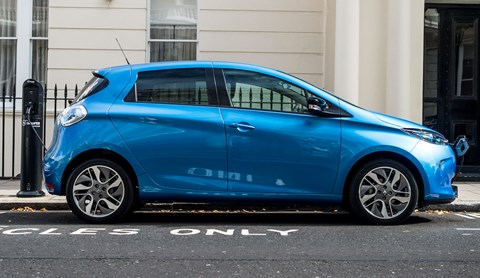
We’d recommend looking at how much you’d potentially use your EV – and then calculate how much you’d need to charge up at home versus on the open road. The likelihood is that an electric car will save you hundreds, or maybe even thousands of pounds a year compared to keeping a conventional diesel or petrol car going – but don’t forget to take an holistic view and consider your VED tax bills, any company car tax, depreciation, servicing and insurance too.
Company car drivers should consider that electric vehicles only attract 2% benefit-in-kind rates for the 2022-23, 2023-24 and 2024-25 tax years. Electric cars are also currently exempt from road tax (otherwise known as VED), so there’s a saving to be had there too.